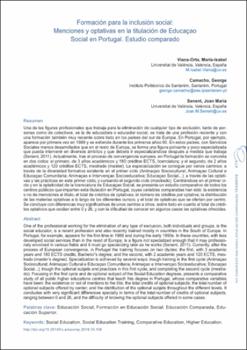Formación para la inclusión social: Menciones y optativas en la titulación de Educaçao Social en Portugal. Estudio comparado
Fecha
2018Resumen
Una de las figuras profesionales que trabaja para la eliminación de cualquier tipo de exclusión, tanto de personas
como de colectivos, es la de educadora o educador social, se trata de una profesión reciente y con
una formación también muy reciente sobre todo en los países del sur de Europa. En Portugal, por ejemplo,
aparece por primera vez en 1989 y se extiende durante los primeros años 90. En estos países, con Servicios
Sociales menos desarrollados que en el resto de Europa, se forma una figura polivante y poco especializada
que pueda intervenir en diversos ámbitos y que deberá ir especializándose después a medida que trabaja
(Senent, 2011). Actualmente, tras el proceso de convergencia europea, en Portugal la formación se concreta
en dos ciclos: el primero, de 3 años académicos y 180 créditos ECTS, licenciatura; y el segundo, de 2 años
académicos y 120 créditos ECTS, mestrado (master). La especialización se consigue por varios caminos: a
través de la diversidad formativa existente en el primer ciclo (Animaçao Sociocultural; Animaçao Cultural e
Educaçao Comunitaria; Animaçao e Intervençao Socioeducativa; Educaçao Social...); a través de las optativas
y las prácticas en este primer ciclo; y cursando el segundo ciclo (mestrado). Centrándose en el primer ciclo
y en la optatividad de la licenciatura de Educaçao Social, se presenta un estudio comparativo de todos los
centros públicos que imparten esta titulación en Portugal, cuyas variables comparadas han sido: la existencia
o no de menciones al título; el total de créditos de optativas; el número de créditos por optativa; la distribución
de las materias optativas a lo largo de los diferentes cursos; y el total de optativas que se ofertan por centro.
Se concluye con diferencias muy significativas de unos centros a otros, sobre todo en cuanto al total de créditos
optativos que oscilan entre 0 y 26, y con la dificultad de conocer en algunos casos las optativas ofrecidas. One of the professional working for the elimination of any type of exclusion, both individuals and groups, is the
social educator, is a recent profession and also recently trained mostly in countries in the South of Europe. In
Portugal, for example, appears for the first time in 1989 and during the early 1990s. In these countries, with less
developed social services than in the reest of Europe, is a figure not specialized enough that it may professionaly
envolved in various fields and it must go specializing later as he works (Senent, 2011). Currently, after the
process of European convergence, in Portugal the training focuses on two clycles: the first, with 3 academic
years and 180 ECTS credits, Bachelor’s degree; and the second, with 2 academic years and 120 ECTS, mestrado
(master’s degree). Specialization is achieved by several ways: trough training in the first cycle (Animaçao
Sociocultural; Animaçao Cultural e Educaçao Comunitaria; Animaçao e Intervençao Socioeducativa; Educaçao
Social...); trough the optional subjets and practices in this first cycle; and completing the second cycle (mestrado).
Focusing in the first cycle and de optional subject of the Social Education degreee, presents a comparative
study of all public higher educations centres that teach this degree in Portugal, whose comparative variables
have been: the existence or not of mentions to the title; the total credits of optional subjects; the total number of
optional subjects offered by center; and the distribution of the optional subjets throughout the different levels. It
concludes with very significant differences specially in terms of the total number of credits of optional subjects,
ranging between 0 and 26, and the difficulty of knowing the optional subjects offered in some cases.





